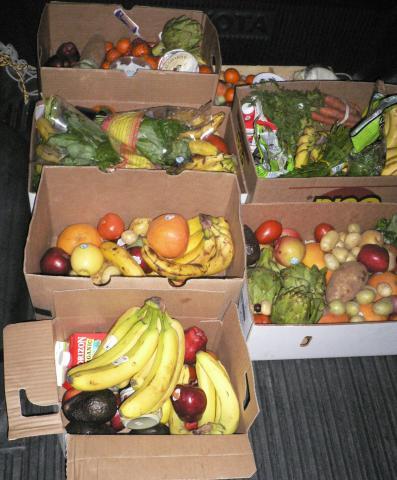
If you live in the United States, about forty percent of your food will go to waste this year. A portion of produce will over ripen on the farm, the market will not sell it all before the appearance becomes unattractive to shoppers, and those forgotten leftovers in the refrigerator will wind up in the landfill. We are all to blame for contributing to food waste. Luckily, conscientious eaters can consume more by wasting less. Here are six tips on how you can reduce food waste in your home:
1. Buy what you need
Making a big trip to the grocery store can lead to excessive spending and wasted produce. Before shopping, make a list. Whether the list is for the week or that night's dinner, stick to it. Impulse buys may often lead to wasted food. Only buy what you will readily consume.
2. Don't make more than what you will eat
If you are the type that likes to have leftovers all week for lunch, that's great! But odds are, those leftovers will wind up in the office refrigerator all week while you go out to lunch with co-workers. If that's the case, only make what you will eat at any given meal. Forgotten leftovers are a waste of time, money, and of course, food.
3. Get creative
If you like to eat different meals, but don't want to waste what you already have, try making something new. Yesterday's veggies can be added to this morning’s egg scramble. Pretty much anything can go between two slices of bread for a sandwich. If the bread winds up going stale, don't throw it away! Stale bread is ideal for a panzanella salad. Use up what's in the kitchen. It's surprising how creative recipes can get when you limit your supply.
4. Make compost
Whatever vegetarian scraps you throw into the trash, throw into a compost bin instead. Coffee ground, tea leaves, and egg shells can go in there too. Homemade compost is healthy for the soil and environmentally friendly. It's easy to do, will save you money, and best of all, save food from the landfill.
5. Turn veggie scraps into broth
If you aren't making compost with your veggie scraps, make a vegetable broth. Save the veggies in a freezer bag and once you have a few cups worth, turn them into a broth. Celery ends, carrot tips, onion, and herb stems are a few examples to start with. Whatever you use, make sure it is clean and edible (rotten produce does not make for good stock)! Now you won't have to make an extra trip to the store when you realize you've already used that last carton of broth.
6. Preserve herbs
I don't know about you, but all the herbs from the store just don't seem to make it. A small portion always seems to go bad before being used. If you won't use all the herbs, store them in the freezer. They can last in there for a few months. Drying herbs is another way to save them for later use. Or, try infusing olive oil. The herbs will add unique flavors that make for a great dipping oil. Either way, they won't go to waste.
Photo Credit: "Dumpster Finds" by Eric Einem is licensed under CC BY 2.0
